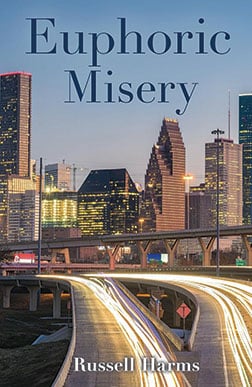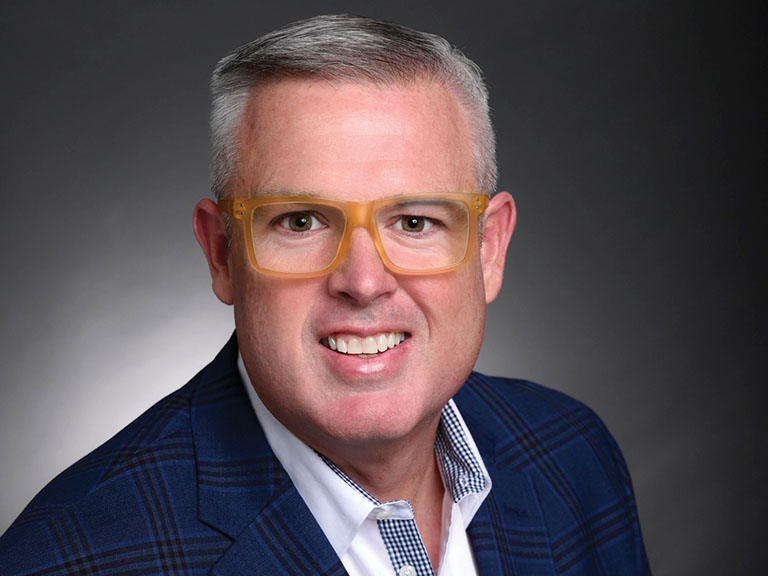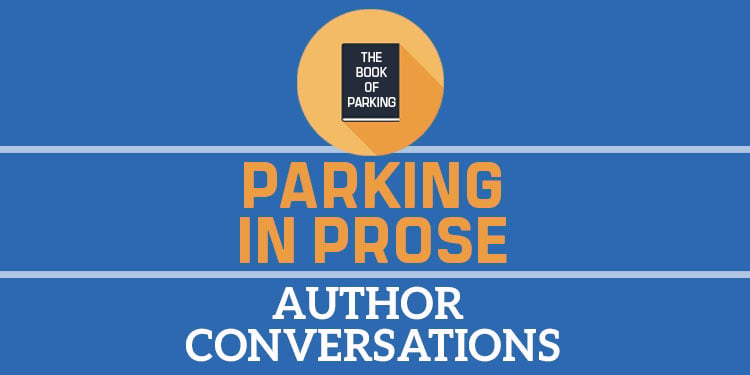In his new memoir, Russell Harms shares his journey through mental health challenges, resilience, and redemption in the high-pressure world of parking and hospitality.
By Jay Landers
Russell Harms, a hospitality executive with 3 decades of experience in luxury hotels and large-scale parking management across the U.S., faced a hidden battle with severe anxiety and depression that disrupted his thriving career and personal life. In his recently published memoir, “Euphoric Misery,” Harms candidly recounts his journey through bipolar disorder, detailing the hardships he endured and the resilience it took to rebuild his life. His story offers a powerful message of hope, redemption, and the strength of the human spirit for anyone confronting their own challenges.
To give our readers insight into the book itself and Harms’ motivation for writing it, Parking Today posed a series of questions to the author. His responses are below.

PT: What inspired you to write your book?
Harms: When I was struggling, I looked for stories about everyday people who had overcome any number of mental health challenges. But all I could find were a handful of wealthy celebrities and athletes who had gone public about their personal battles. I believe the negative stigma of mental illness prevents people from speaking openly about their struggles.
After years of trying to navigate debilitating anxiety and depression on my own, I finally worked up the courage to seek help and saw a therapist for the first time. After an hour of pouring out my guts, I was told there was nothing wrong with me and to just power through it. I knew in my heart this was wrong, and it wasn't until I was hospitalized years later that I learned I had bipolar II disorder. My motivation in sharing my story is to hopefully enable others to feel less alone and realize that they are not alone and that there is hope. If I can help prevent at least one person from unnecessarily suffering and help them find the courage to seek help, I will have completed my mission.
Harms: This is twofold for me. First, I'd like people to know that no one is immune to mental health challenges — it does not discriminate. From the new entry-level employee to the chief executive officer, the majority of people navigate varying degrees of mental health challenges at some point in their life. It could be a bout of depression, anxiety, or even unresolved trauma from childhood. Second, you never know who is fighting a daily battle that you know nothing about. A lot of people put their game face on every day but inside they are struggling. Kindness matters.
PT: How did your experiences in the hospitality and parking industries shape your understanding of mental health challenges?
Harms: I think it's made me a more compassionate person. At times, our industry can be very demanding and fast paced. Whether it's a technology glitch or staffing issue, our customers don't think about what hurdles we face. They just expect the parking systems to work and the staff to be responsive. When I experience a breakdown in service now, whether it be at parking facility or a restaurant, instead of getting frustrated like I used to, now the first thing that pops in my head is that there are likely circumstances that I'm not aware of and to show the staff some grace.

PT: What advice would you give to someone in the parking or hospitality industry who might be struggling with similar challenges?
Harms: Don't ignore the signs of mental health issues. If you've lost interest in things that used to bring you joy, have trouble concentrating, or feel overwhelmed, it's time to seek help. There's no shame in asking for help — quite frankly it's one of the bravest things you can do for yourself and your family. Society doesn't judge diabetics for taking their insulin, or people with hypertension for taking their blood pressure medication, so why should someone who needs a little help regulating their emotions feel judged? You don't have to tell anyone that you're seeking help but seek it sooner rather than later.
PT: Looking back, is there anything you wish you had known or done differently when you first started facing these challenges?
Harms: Absolutely! I wish I had known that I was not alone. Had I sought help sooner I would have learned that approximately 25% of Americans face a wide range of mental health challenges. We just don't talk about it openly due to the stigma. I wish I had asked for help years earlier instead of trying to manage it on my own.
PT: What specific strategies or practices helped you rebuild your life during and after your struggles?
Harms: Therapy was a life saver for me. It took several attempts to find the right therapist, and once I did it helped me immensely. I've also learned to recognize the signs of looming depression and anxiety and getting ahead of them. If I find myself sleeping too much and disengaging with friends and family, I focus on my physical and emotional health to avoid a bout of depression. If I feel more stressed out than normal and am worrying too much, I recognize it's a likely case of anxiety and I consult with my doctors.
PT: Were there specific aspects of overseeing large-scale parking operations that contributed to or helped you navigate your mental health journey?
Harms: I've learned over time that sticking to a routine is paramount to maintaining my emotional health. Staying busy is a good thing. At times the parking industry provides a lot of autonomy and it's easy to get distracted and lose motivation. I think it's important to stay connected, celebrate your victories, and find joy in your work.
PT: How did your career in hospitality and parking management influence your resilience or perspective during your recovery?
Harms: Our industry is filled with people who approach every day with a never-give-up mentality. In some ways, it's like a big family. I'm grateful that my relationships with most of my closest friends, mentors, and even my wife were built on the front lines of the parking and hospitality industries. Those relationships are what helped me get through the worst of times, for which I am eternally grateful.
PT: Are there particular lessons or moments in your journey that you feel are especially relevant to professionals balancing demanding careers and personal challenges?
Harms: At times in my career, the company I was working for experienced years of hyper growth. Adding new accounts, hiring new staff, and deploying new technology became very taxing. When I finally learned to recognize and engage talented individuals who had the aptitude and desire to contribute, my life became so much more manageable. Similar to navigating mental health challenges, I used to take on too much, determined to find a way to get it all done. When I finally raised my hand for help, we accomplished so much more.
PT: How do you think the parking and hospitality industries can better support employees dealing with mental health challenges?
Harms: In several instances I came across a boss or leader who simply made people miserable. We've all encountered people in our career who were difficult to work with, and we just try to make the best of it. However, I have to accept accountability for not handling these scenarios in a more professional manner.
It is disheartening when an organization has been told time and time again that they have a bad apple who's adversely affecting a lot of people, but they choose to dismiss it. Unfortunately, I've seen this on several occasions. I would encourage owners and stakeholders not to tolerate people in their organizations who do not embody their core values, no matter their contribution. As they say, where there's smoke, there's fire.
PT: You are going to speak this year at Parking Today Media’s Parking Industry Expo (PIE). What will you be discussing at PIE25?
Harms: My hope is to be a voice for those who cannot speak openly about their struggles. For years I was afraid that people would think I was weak if they knew what I was dealing with. I worried about my employment and if I would be able to provide for my family if I became labeled as someone who struggled with mental health. I also want people to know that they are not alone, as I felt I was for decades. I hope that people can learn from my mistakes and recognize the signs if they or a loved one is suffering. Too many people do not even know that they need help, and once they recognize that need it can be overwhelming determining how to seek professional help.
Have you recently written a book about parking? Or know of one that you think others in the industry need to read? If so, contact Parking Today at editor@parkingtoday.com to let us know!
Jay Landers is the editor-in-chief of Parking Today magazine. He can be reached at jay@parkingtoday.com.













